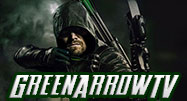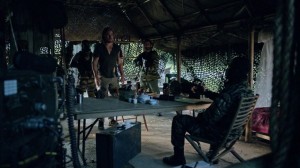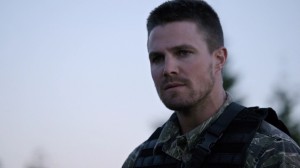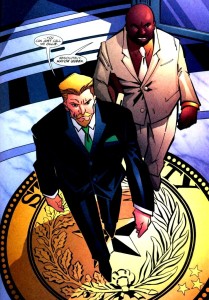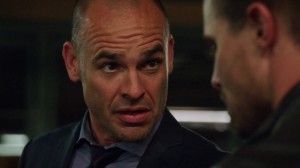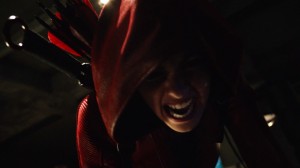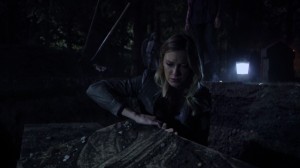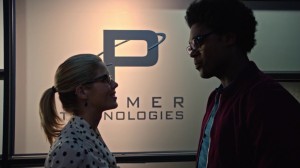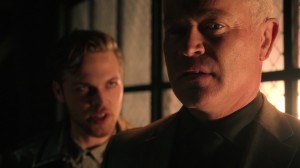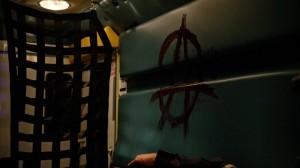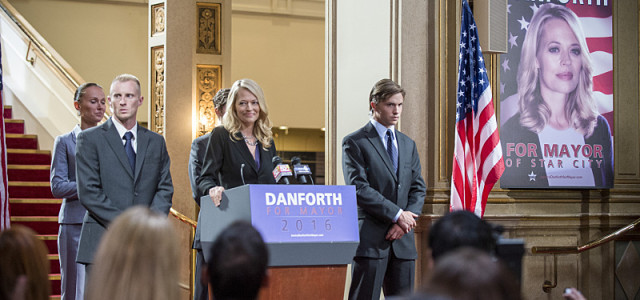
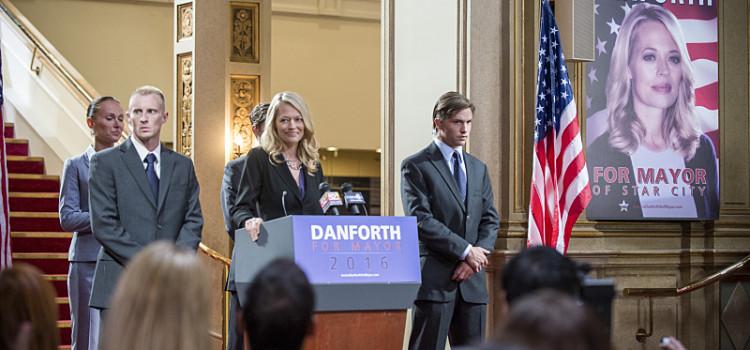
Arrow #4.2: “The Candidate” Deep Review
Recaps & Reviews October 18, 2015 Matt Tucker

Summary: A seeming simple episode that instead offers a vast array of story possibilities for the season.
If you have not seen this episode yet and do not wish to be spoiled, do not continue reading!
For a full episode synopsis, grab a read of our Quickshot Recap: #4.2: “The Candidate”
Review
Whereas last year didn’t seem quite to know what to do with the flashbacks, this year is decisive and decidedly on-point. In fact, both the past and present storylines for Oliver this season seem to be heavily influenced by very specific storyarcs from the comics. So much so that this feels, in ways, like a reboot of the show, perfectly suited to go along with the new name and the tweaks in tone. Nowhere is that more evident than in the fact that they’ve shorn past Oliver’s hair.
Now, how can we tell the difference between the two time periods?
Oliver, Then…
The flashbacks have always been a bit of a sticky wicket for the series. In concept, at its very basest a smart one, they are supposed to reveal the events that took a spoiled playboy and forged him into a living weapon, who might have lost some of his own humanity but had the care for the denizens of his city in his heart. In execution, the first season was plagued with the idea of how to properly integrate these story elements into a given present plotline. It was in the second season that these took on a more concrete and essential quality, detailing the crumbling relationship between Oliver and Slade Wilson that gave weight and presence to the modern day events. The third season had the opportunity to tell something dramatically different. While the Hong Kong sojourn certainly was different, the plot was threadbare and seemed to meander along until finally finding its way toward the end of the season. To be frank, it often felt like the flashbacks were there just because the concept was a part of how the series does business.
Here, in Season 4, the show is finally giving us the more traditional Green Arrow origin arc — Oliver fights drug runners on the island and that’s how he learned his skills — and it’s a boon because it actually feels directed. His initial comic origin had him fighting pirates on a boat to make his escape from the island he’d been stranded on. This was altered to Oliver fighting and catching some marijuana growers on the island and using their means to get back home. That was eventually revised by the story found in Green Arrow: Year One, one of the works that served as main reference in the creation of this series. Oliver finds and frees slaves forced to harvest poppy seeds for opium and heroin by our old friend China White. He then used the story about the marijuana growers as a cover to downplay his involvement when he and the slaves are eventually rescued.
It seems kind of funny that it’s taken us until year 4 to get this distinct aspect of the Oliver Queen story, yet it’s exciting to use this as a firm foundation for the story ahead. Needless to say, though they needed to get Oliver back to Lian Yu at some point, it’s a bit unexpected that they got him back there so soon. And then to have him shave his hair down. I’m sure Stephen Amell is probably breathing sighs of relief that he doesn’t have to futz with the wig during the flashbacks this year. That said, we’ve all seen what Oliver looks like when he eventually allows himself to be rescued from the island. Being intimately knowledgeable of growing both long hair and a beard, that’s well more than a year’s worth of growth, so at some point this year he’s going to have to begin that process.
For now, he’s a soldier in Reiter’s army, which if I recall correctly is actually going to be tied to the Shadowspire criminal organization that the character heads in the comics. Reiter, by virtue of not being a very white ultra-fascist like his comic forebear, already proves a fascinating antagonist for the flashbacks. There are immediate shades of Season 1’s Eddie Fyers, what with all the leading of soldiers on the island, but this is a very different story. How this relates to Oliver’s deepening work with Amanda Waller & A.R.G.U.S., and potentially whatever elements introduce Oliver to the mystical side of the world, holds good promise.
…and Now
In the comics, Green Arrow was initially nothing more than a Batman clone run through a Robin Hood prism. To distinguish the two, writers began to heavily invest Oliver Queen with the virtues of the English mythical rogue, placing him on the liberal side of the political spectrum. This was heavily enforced during a run of the Green Lantern comics in the ’70s where Oliver teamed with the more conservative Hal Jordan to tour America and debate the divisive sociopolitical issues of the day. As such an outspoken progressive, it only made sense that Oliver would eventually try his hand at actual political office. The idea of Oliver Queen running for mayor of Star City first appeared in 1979, where he ended up losing the mayoral race.
Oliver would eventually become mayor of the city in 2006, but he was both outed as the Green Arrow and as the financial backer for a group of heroes called the Outsiders, at the time thought to be a clandestine cadre of bounty hunting criminals. He had to resign the office, but certainly never gave up his political beliefs. This is all to say that there is precedent for Arrow‘s Oliver to seek out the heretofore most deadly job in Starling/Star City. As of yet, the show has steered very clear of any political leanings on Oliver’s part, preferring to focus on the backstory, motivation, and ethics of his vigilante crusade. They touched on his philanthropy and corporate social responsibility in Season 2, as he was subtly goaded into aiding Sebastian Blood during his campaign, yet we’ve never seen the bleeding heart liberal in any fashion. They still skirt the issue by having Jessica Danforth frame the intention behind the job as something to instill hope in the citizens to engender community and make Star City a place deserving of heroes like the Green Arrow to fight for.
It’s going to be very interesting to see how they toe the line with the political moving forward this season. They can assuredly stay vague, much as they did with both Blood and Moira Queen’s campaigns, doling out platitudes of doing well by the citizens more than delving into actual political rhetoric. Yet, this is such a fundamental change in Oliver’s drive in life, both personally and publicly, that it would seem like a missed opportunity to not get at what Oliver truly feels about various issues. This is very boldly underlined by the fact that he’s never served in public office in any capacity before. The risk, of course, is that the show could either be too naive on the politics or become too preachy, and it’s a very intriguing tightrope they’ve walked themselves out on.
It’s known that there are fans of the series who prefer to deal with the series as its own identity and aren’t fond of when it is compared to its comic book origins. Yet, it can’t be denied that, at its core, this is an adaptation of previously existing work. That allows them to do their own things with the material and bring new aspects to it, but it also allows them to borrow from the source material to tell compelling stories. For fans of the comics, some of whom might have felt underserved at various points by the show, this is an exciting development for both the present plot and the flashback storyline.
Skeptical Lance
The episode works in three primary modes in the present: Thea’s anger and the side effects of the Lazarus Pit, Felicity’s acclimation to running a business let alone a conglomerate, and it focuses on whether or not Oliver & Team Arrow can do things different than in the past and if that will have an inspirational effect on the city.
We’ll get to things with Thea and Felicity momentarily, but there’s an interesting way they make use of Quentin Lance this episode that really gives the contentious relationship between Lance and the vigilantes more depth and character. Usually in superhero stories, they play the cop-hero relationship in either part of a binary fashion: the cops are against the hero or they work with them, even begrudgingly. Arrow has already played at this with Lance learning to accept the Arrow’s help and work together against Slade Wilson and other criminals. That changed last season, and it’s wholly right to blame that on a personal conflict for Lance more than anything else.
Perhaps it’s that personal conflict that has paradoxically allowed him to maintain a hand’s-off approach when dealing with Team Arrow. His daughter being involved has to factor into that. He’s tolerated them doing their thing, even if he doesn’t trust them. He knows who each and every one of them are and where to find each to take them down at any point. Yet, he hasn’t, even with the searing hate and anger he feels, most specifically toward Oliver. It’s an alluring position to put Lance in, especially with how rabidly he went after the Arrow last season. His uneasy alliance with Damien Darhk adds a whole other element, particularly as we learn this week that Darhk is definitely eyeing Laurel as a target should Lance step out of line with his plans.
It’s Lance’s openness that enables the complexity of the relationship to work this episode. In his heart of hearts, it would appear he genuinely believes Team Arrow can do some good, specifically with the types of threats that the city is up against. That’s very much at odds with his cop’s head and experience, which is what fuels that disgust that Paul Blackthorne excels in. Yet, he still holds court with both Laurel last week and Oliver this week on the crew aiding his overwhelmed force, and calls the heroes in off the bench to rescue Madison Danforth from Lonnie Machin. That makes it sting that much more when his distrust of Team Arrow doing things different this time around bears out when Thea manages to seriously injure Machin by lighting him on fire. Oliver kept pressing and insisting that the attitude and approach have changed, and the audience is privy to the attempts of everyone aside from the clearly affected Thea. Lance can only see the results. How much his olive branch is pulled back and for how long is really up in the air, and that makes the contentious relationship one to pay close attention to this year.
What will be truly interesting is when Lance hears word of Oliver’s bid to be mayor.
Berserker
The show should be commended for asking a very specific question in relation to the issue of the Lazarus Pit having altered Thea in any fashion. Diggle ponders aloud why it’s taken six months for these effects to finally kick in. It’s a very relevant question that hopefully has a strong and plausible answer. Otherwise, keying it to the real-world passage of time in the world of Arrow feels a matter of circumstance more than something justified. Beyond that, there are implications for any intended further use of the pit going forward. That’s not to say that this is really the first that Thea has shown symptoms. Diggle mentioned last week that she seemed as eager and unchecked as Oliver did when he first started, so there would seem to be a bit more precedent to her current behavior.
The Lazarus Pits in the comics would temporarily drive the bather insane immediately upon use, as well as grant them superhuman strength, but these would wear off with no residual effects. Arrow is definitely charting its own course with this, and I’m curious where this will head. It’s a bit surprising that they’ve addressed it head-on so quickly, though it really shouldn’t be. Oliver wants to see that his sister is okay, and it gives a logical set-up to Laurel wanting to make use of the pit for her own reasons. The concern, though, is that we’ll run into a similar problem as last year. Giving Thea the motivations of her relationship with Malcolm, as well as the reveal of her as Sara’s unwitting killer, were great kindling for storyline for her character. Yet, they burned nearly all of it up before the winter hiatus, and there became little for Thea to do for good chunks of the rest of the season. Here’s hoping they can’t immediately solve the issue with her flash rage in the travels to Nanda Parbat because the last thing they need to do is undercut any sort of narrative thrust for her.
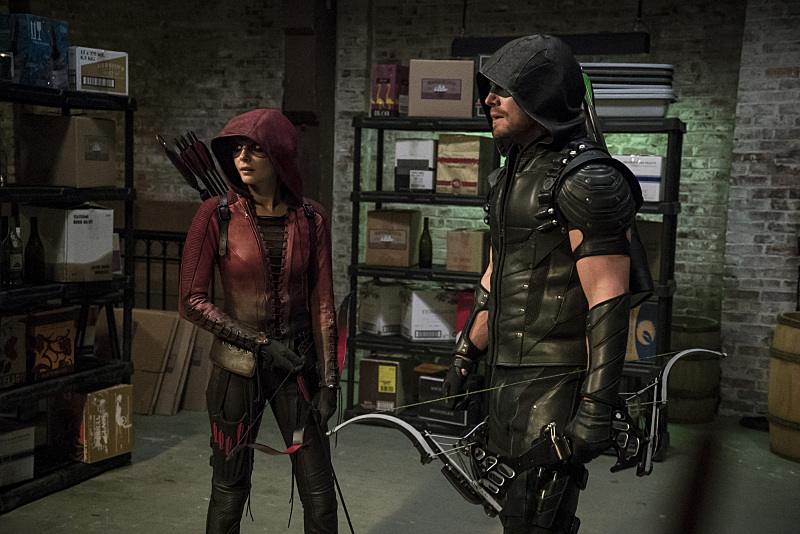
While the rage angle falls back to similar beats for Roy Harper and Slade Wilson and the Mirakuru — and like how Roy’s affliction with that formula served as stand-in for the comic version’s heroin addition, the side effects of the pit offer loose substitute for Thea’s comic counterpart, Mia Dearden, and her struggles with being HIV-positive — it also sets up a very specific kind of interaction between brother and sister. Yes, the team has run on its own without Oliver’s involvement for a while, but one can’t avoid what looks to be yet another opportunity for Oliver to mentor a mask. Getting a taste of Green Arrow and Speedy in action together was a great treat, her complete botching of the takedown of Machin aside, and the chance to see them paired in the field on a regular basis is an appealing one. Yes, it’s still weird that everyone close to Oliver has been roped into this masked existence, most especially Thea, but if we get to finally see a true mentorship out in the field, that will be additive to both Queen siblings. And with Ra’s al Merlyn still out there, a fertile dynamic is being developed to plumb story for the season.
Dancing with the Devil
It’s Malcolm Merlyn that Laurel is going to have to deal with to move her plan to resurrect Sara forward. First, though, is anyone else baffled that this is the first that Laurel is hearing of any of this about Thea and the pit? Sure, she didn’t go with the team to Nanda Parbat to get Thea to the pit, instead spending time in Starling training with Nyssa and testing out the new Canary Cry choker that Cisco Ramon designed for her. But you would think she would’ve been filled in at some point over the last six months. That niggling issue aside, it was a solid development that Laurel’s awareness of the pit is what immediately sparks the idea of bringing Sara back, regardless of any implications. It’s always nice when you can follow a true logic that leads to a decided plot point. The whole resurrection of Sara is bothersome on its own accord, but at least there’s a rational progression for how we get there. And it’s a rather simple and straightforward one.
Of course, Laurel isn’t thinking of the consequences. In a way, this is classic Laurel, something she somewhat shares with her father. They’ve painted Sara as the more free-spirited one of the family, some traits that she seems to have gotten from her mother Dinah, though Sara took it to further extremes. That obviously led to very specific outcomes in her life, and demons that she will still have to deal with in coming back from the dead. Laurel, though, was seen as the more responsible of the two, aligned similar with her father. Yet, both Quentin and Laurel share a bullheadedness that can be sparked by emotional response. They can head down certain paths, fired by justification rather than considered thought. Certainly, if she considered the ramifications on her father and mother by bringing Sara back to life, it might give her some pause. Yes, they’d love to have their baby back; what parent wouldn’t? But at what cost? And once again not including her father in that process after the tearing down of the relationship due to hiding Sara’s death from him in the first place, this has the potential to irreparably destroy their connection.
Bless Laurel for having the ability to do something that should be impossible. How can she not attempt it? What will it hold for Sara, though, let alone the rest of the team? Laurel already dealt with her perceived deficiencies as a hero in light of her sister, so what will the opportunity to fight side by side with her offer? It’s unconventional — and I still have reservations about the whole thing — but it does offer some intriguing possibilities.
Corporate Bosom Buddies
If there is something that Felicity desperately needed, it was a storyline of her own apart from Team Arrow. Even her relationship with Oliver is intimately wrapped up in the hero game. To really help reclaim a sense of her personality that got lost in the shuffle last year, setting her up as the CEO of Palmer Technologies in Ray’s absence is actually quite the gift. Yes, there are still issues with the plausibility of her taking on the role — she even mentions the deficiencies in her qualifications at the board meeting — but one can’t ignore that throwing Felicity Smoak in situations that are initially out of her depth are opportunities for the character to shine. And making her not only have to actually assume the day to day responsibilities of Ray’s company, which will feature a steep learning curve, but also have to face the financial reality of staffing and the bottom line, allowed us to feel her innate compassion and witness her ingenuity in ways other than miraculously cracking complex computer systems in no time flat.
Beyond that, though, Felicity has a new friend! One she can call her own, and they are perfectly paired. The thing to appreciate about Curtis Holt is that there is similar DNA between the two in their tech backgrounds and somewhat how they communicate with the world, yet they don’t feel like similar characters. It’s an important distinction because, while it’s great to have someone outside of the team connect with her, having a character too similar to Felicity wouldn’t challenge her and would become superfluous for the audience. Echo Kellum is a great presence and already the two appear to have a great chemistry to play off of each other. My primary experience with Kellum is through the short-lived sitcom Sean Saves the World, and I wasn’t sure if his delivery on that show was a performance or something more innate to him as a person. Turns out it was the former and that makes his Curtis a nice little surprise.
Giving the two their own distinct story goals that require them to work together to accomplish is also a smart choice. Just introducing someone outside of the Arrow circle for Felicity to interact with would’ve made it too nebulous on how to work that person into any given episode. That they have to develop a technology that will help preserve the company and the jobs of those they rehired after the board had decided to go through with the R.I.F. is a very specific intention that keeps the two focused yet also allows them the fun of discovery as they have no idea yet what that technology will be. One can anticipate that their scenes will be a distinct reprieve from anything else go on on the show.
Another great aspect is how casual they are with Curtis’ sexual preference and that he has a legal husband. I read an interview with Katrina Law recently about what to expect from Nyssa heading into Season 4, particularly given the impending resurrection of Sara. They also touched on the rather noxious notion of Ra’s al Ghul forcing his daughter to marry a man (Oliver) last season. She understood the outrage and backlash from some of those within the LGBT community over such an action but also understood that it was a statement on specific attitudes that sadly still very much exist in this world. Not just within the gay community, but women and daughters specifically were considered property of men for so long and marriages of convenience that paid little or no regard to the actual feelings of the woman in the situation were regular practice for hundreds of years. It still goes on in some cultures and it was a reflection of that. In response, Law felt that the way Arrow dealt with the relationship between Nyssa and Sara was a big deal precisely because it wasn’t a big deal. In the comments on the article, some people noted that they were baffled by such a statement and that it didn’t make any sense. Nothing could be further from the truth. Arrow has taken special care to treat the LGBT relationships on the show primarily as just relationships between two people. That approach is a big deal in the public perception of such relationships primarily because it’s just accepted within the world of the show. Curtis’ relationship with his husband is another such example. He mentions his spouse just as anyone would and Felicity doesn’t bat an eye at the concept that he would be married to a man. It was a welcome approach with Sara & Nyssa and continues to be in this case.
Drawn in Blood
Amidst everything with Oliver, Thea’s anger issues, Felicity’s corporate initiation, and Laurel’s rash decision, the episode also offered something that’s actually kind of rare on the series: the birth of a villain. That seems like a weird statement to make, but it’s rather true. Most of the villains that appear on the series either show up for an episode, maybe two at the most, and are dispatched. And most arrive with their nefarious intent already intact. Even Malcolm Merlyn, the show’s longest serving antagonist, had already kicked his initial bad guy plans off prior to the series starting. We’ve really only seen Slade Wilson, the Count, and now Lonnie Machin grow into their iconic alteregos. If we’re being generous, we could toss Sebastian Blood and the Huntress on that list, but Blood was already trading in his Brother Blood persona when we were introduced to him, and Helena actually has the potential for redemption and change.
To be fair, Slade’s was a fall from grace, and the Count and Machin were both presented as criminals first, but all three actually transition into new personas. (Through the magic of flashback, we also got to see Floyd Lawton’s transition from proud, haunted soldier into a mercenary, and Merlyn’s shift through bereavement, but I digress.) In Machin’s case, he’s an accomplished though rather standard mob enforcer employed by Damien Darhk to scare Danforth off of running for mayor. The lack of a true government head better aids Darhk’s intention to choke life from Star City and remold it in his own vision. There’s nothing truly exceptional about Machin, but he is effective and has a strong sense on how to cruelly motivate others into action. He’s a very competent physical fighter, which always adds a fun element to any Arrow villain given the show’s bent for quality action. I can’t say much about Alexander Calvert’s performance beyond that he was efficient in the role.
There’s the promise, though, that there is going to be more to the role. That makes it hard to really evaluate what Calvert brings and will bring to the show. We have yet to see what he was actually hired for, but the set-up by episode’s end is impressive. The choice to make him an effectual but unremarkable single-episode threat to kick off his storyline is both appropriately deceptive and a potent one. It’s much like the myriad fingerprints he cobbled together to throw people off of his identity. It’s a nice fake that belies what he’s truly going to be capable of and just how he’s going to play into the season. When his Anarky resurfaces, having been initially thwarted and grimly charred, he truly will be a wildcard, not only to the police and Team Arrow but also to Darhk and his particular efforts.
It was interesting that they had Darhk not approve of Machin’s methods in the end and actually work to countermand what his hired thug was doing by offering Lance the information to stop him. It adds further layers to Darhk and establishes a distinct code of conduct for him. That confidence and assuredness in his plans and methods asserts itself again and underlines his commanding qualities as the main threat this year. How Anarky will come back to bite him, and his response, are encouraging prospects. It’s perhaps jumping the gun a bit to be excited that Arrow may have finally gotten the establishment of two convincing main season foes done right, and we’ll have to see how the menace plays out a bit further to see if that’s valid. Still, the gruesome start to Anarky coupled with the artful and adept way Darhk has positioned H.I.V.E. should make fans giddy with the potential. Then, there’s the Reiter and Shadowspire storyline awaiting in the past, the ramifications of Sara’s resurrection and its eventual gearing up of DC’s Legends of Tomorrow, Diggle’s quest for justice for his brother, Felicity and Curtis’ lab time adventures, and Malcolm Merlyn’s leadership of the League of Assassins. (Not to mention his connections to Thea, Laurel & Sara, Nyssa, and the League’s relationship with H.I.V.E.)
Conclusion
This season is positively brimming with story, something that “The Candidate” makes abundantly clear. Much like Machin’s role in the episode’s plot, the hour is deceptively simple. Old family friend wants to run for mayor but gets scared off by the realities of the city. Thea was potentially changed by the pit, and not only do they want to find answers but the news sets Laurel off on what seems like a simple fix for the loss of her sister. Felicity starts works, finds out she has to fire people, and comes up with a better alternative. Oliver decides he can be more than just the Green Arrow to affect change in the city and bring hope back to the people. And in the past, he infiltrates a drug ring for Amanda Waller. Yet, within those straightforward storylines are the germs of significant narrative potential that elevate the whole hour. What’s more is that production appears to have a strong grasp on all of it, and like Darhk, their storytelling is confident. It’s not hard to get excited about the show again when it has as strong of a sense of itself.
Odds & Ends
• Damien Darhk namechecks one of Machin’s former employers, and Felicity mentions the name as well. I couldn’t make out the name and thought, perhaps, it had a major significance. Turns out the name was Rick Pinzolo, a character on the 1980’s TV mob drama Wiseguy, a show of which executive producer and showrunner Marc Guggenheim is a known fan. As a bit of trivia, Wiseguy was the series that first brought actor Kevin Spacey prominently into the public’s attention. The show was also notable for one of my favorite forms of serialized storytelling, featuring a number multi-episode arcs within the season. Spacey’s character’s arc was a 12-episode story that made up the second half of the first season. Other arcs ranged from 4 to 6 episodes. It’s no doubt dated now, but it’s definitely worth a watch if you’ve never seen it. Thanks to Halberdier17 for the clarification on the name.
• Hadn’t really thought of the possibility, considering we’ll likely see her dead body lowered into the Lazarus Pit, but it was a bit unexpected that they actually opened Sara’s coffin. Kudos to the effects team on the decomp look used on Caity Lotz.
• “I know I don’t have a business degree, or an accounting degree, or an MBA…” Though an MBA is most assuredly a business degree, Felicity was likely making the distinction between a business management and a business administration degree.
• “Let’s get something straight. The only person who is allowed to talk in sentence fragments around here is me.”
• “You know your hand is on me.” “Language.” Damien Darhk’s casual menace and expectation of specific decorum are tasty little character bits. Already really enjoying Neal McDonough in this role.
• “Thea’s gone Pit Crazy.”
